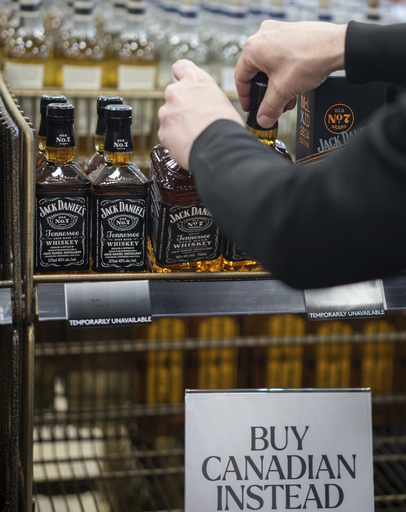On Wall Street, stocks across various sectors experienced significant declines on Monday, largely due to tariff concerns raised by President Donald Trump. The American automotive, technology, and retail sectors were notably affected as ongoing negotiations among the U.S., Mexico, Canada, and China regarding trade tariffs unfolded. Over the weekend, Trump announced that potential 25% tariffs on imports from Canada and Mexico would take effect on Tuesday, although he provided a 30-day delay for those countries. Meanwhile, tariffs of 10% against China remain in play.
The automotive industry is expected to struggle amidst these tariffs, considering that the production networks of automakers are closely linked across the nations involved. Major players such as General Motors experienced a decline of 3.2%, while Ford dropped 1.9%. Other automakers like Stellantis and Tesla saw decreases of 3.9% and 5.2%, respectively. According to S&P Global Mobility, in 2024, approximately 22% of all light vehicles sold in the U.S. will be imported from Mexico. Furthermore, General Motors and Ford depend on imports, sourcing around 22% and 15% of their vehicles from Mexico.
The impact of tariffs extends to companies producing automotive parts as well. For instance, Visteon, a key supplier for Ford, General Motors, and Volkswagen, witnessed a 3.4% decline. Aptiv and Goodyear Tire also saw drops of 2.8% and 1.9%, respectively.
Meanwhile, the beverage sector, especially companies dealing in liquor and beer, has fallen under the weight of tariff anxieties. Several Canadian provinces are retaliating by planning to remove American liquor brands from government-owned stores. Constellation Brands, which has exclusive rights to import Corona and Modelo beers from Mexico, fell by 3.5%. Furthermore, AB InBev, the parent company responsible for these brands outside the U.S., saw its shares decrease by 1%. Molson Coors, known for its Molson and Coors brands, slipped by 2.5%, while Brown-Forman, the distributor of Jack Daniels whiskey, experienced a 3.3% decline. Diageo, the owner of brands like Smirnoff, Johnnie Walker, and Crown Royal, also saw a reduction in its shares by 2.5%.
In the technology sector, which has been instrumental in pushing the market to new heights, ongoing tariff issues have added further pressure. This comes in the wake of concerns regarding intensified competition from China’s DeepSeek, an artificial intelligence firm. Nvidia, a leading semiconductor company, dropped 2.8%, while Apple, known for its iPhones, fell by 3.4%. Both companies are significantly reliant on Chinese production and sales, with Nvidia earning nearly 39% of its revenue from China and Apple about 16%, as reported by FactSet.
The retail sector, particularly clothing and other retail businesses, is especially vulnerable to tariff fluctuations. These retailers depend on goods produced in countries like China and Mexico, where consumers benefit from lower prices on imported items. Nike’s stock fell 0.4%, reflecting its reliance on China for 22% of its finished products and 30% of its raw materials, compared to just 4% made domestically in the U.S. Best Buy, as an electronic retailer also reliant on foreign production, saw its shares decline by 2.4%.
Lastly, homebuilders are facing the prospect of higher costs if tariffs cause a spike in the prices of wood and other construction materials. Canada is a key lumber exporter to the U.S., and companies like Lennar and Toll Brothers faced declines of 3.8% and 3.2%, respectively, indicating the ripple effects of these tariff discussions across the economic landscape.




